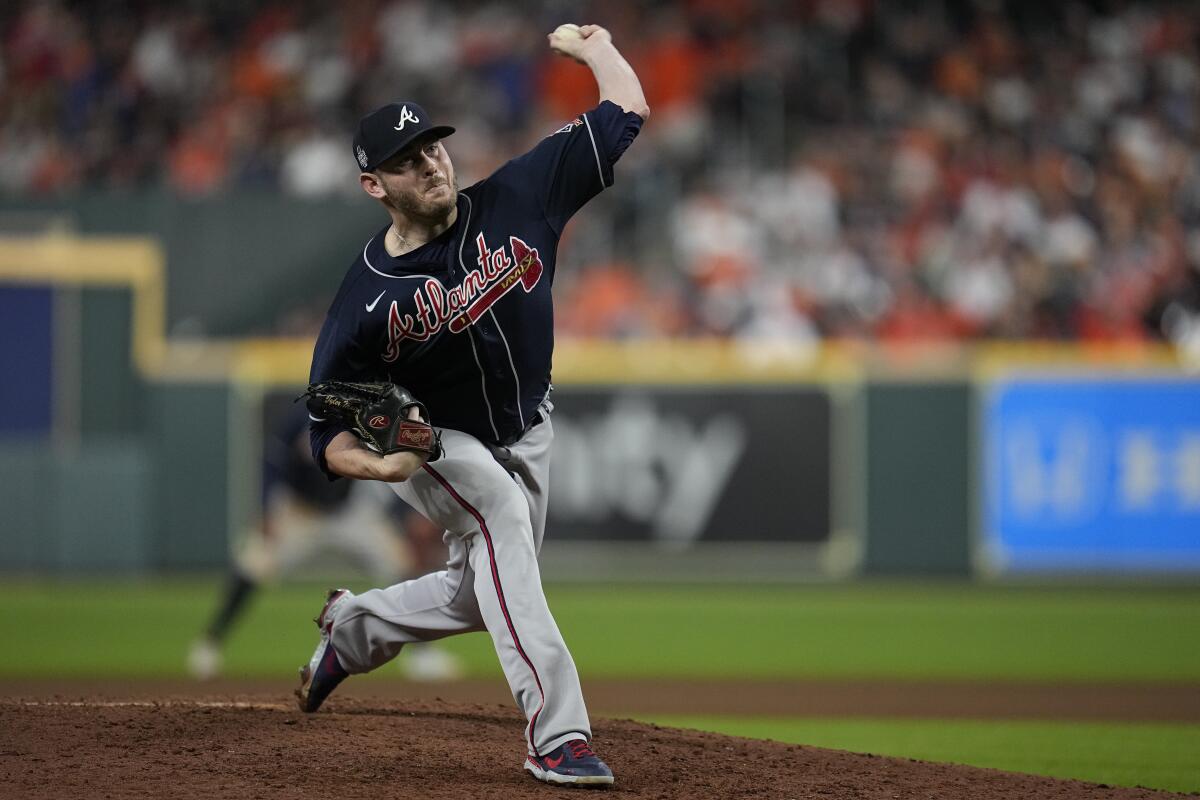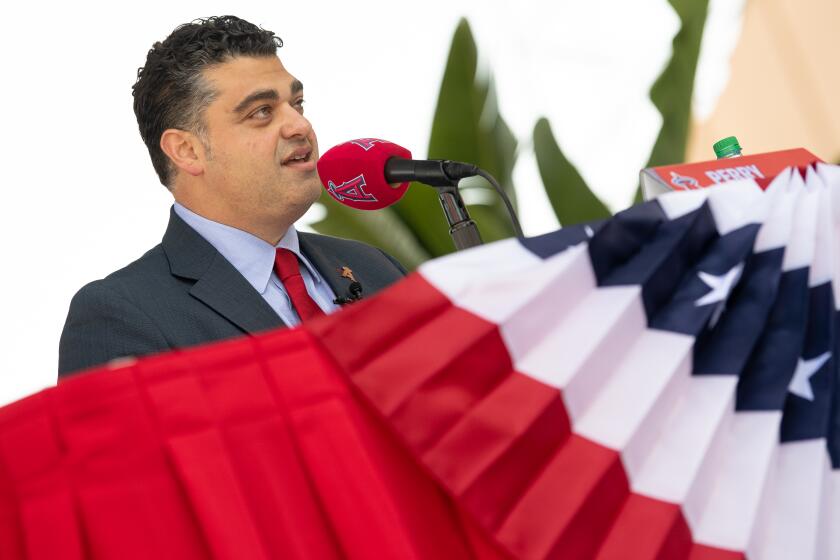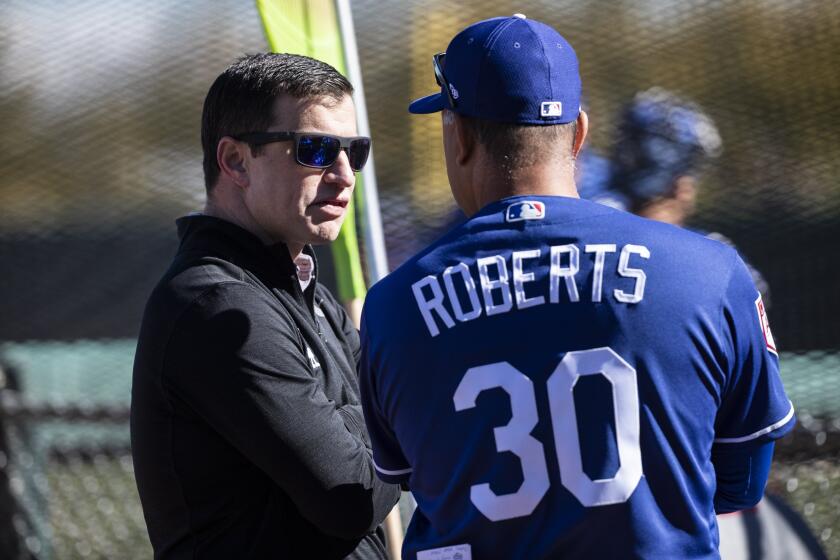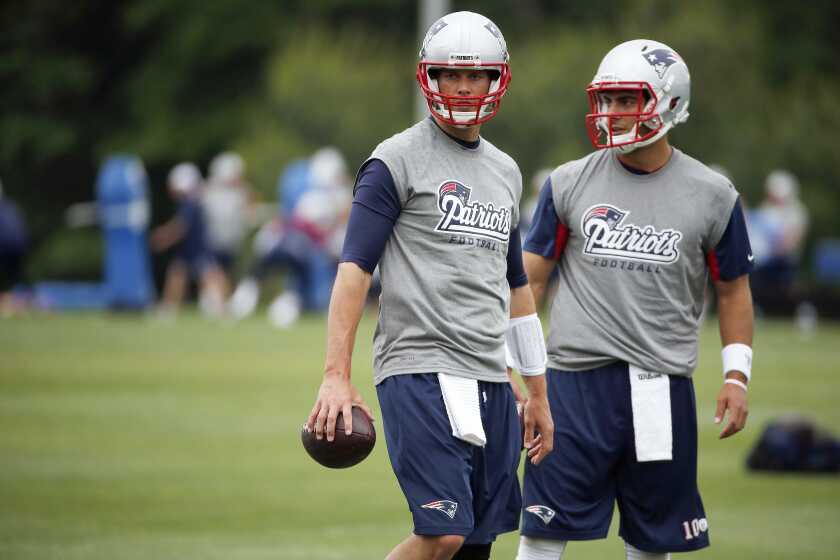Atlanta reliever Tyler Matzek an inspiration after regaining control of his career

ATLANTA — The first time they crossed paths, A.J. Minter wasn’t familiar with Tyler Matzek’s story.
It was late in the 2019 season at the Atlanta Braves’ triple-A affiliate in Gwinnett, Ga. Minter had just been sent down from the big-league club. Matzek had recently been signed to a two-year minor-league contract, unusual for a player plucked out of independent-league ball.
What Minter immediately recognized in the fellow left-handed pitcher was talent. A hard fastball, a crisp slider, an ability to get batters out on either side of the plate.
The things Minter didn’t yet know about his teammate were far more impressive — and far more inspirational.
Ten years earlier, Matzek was on the path to being a future MLB star. He was a top prep talent coming out of Capistrano Valley High in Mission Viejo. The 11th overall pick of the Colorado Rockies in 2009. A consensus top prospect who rose to the big leagues in 2014 by the time he was 23.
Then, everything unraveled.
It started with the “yips” — which, in baseball, is the sudden inability for pitchers to pitch with any semblance of consistent accuracy, to where a game of catch can even become difficult. As his walk rate skyrocketed, he was demoted to the minor leagues, then turned loose by the Rockies organization.
By 2017, he was out of baseball, uncertain if he’d ever come back.
“It was so, so far away,” Matzek said. “I never thought it would actually possibly happen.”
Like so many others in the Braves organization and around baseball, Minter looks at Matzek now and can hardly believe he’s the same person.
The Matzek he knows can paint the corners, pound the zone, and overpower opponents with a fastball-slider mix.
The Matzek he sees is one of the Braves’ most important relievers, the set-up man who helped them finish off the Dodgers in the National League Championship Series and get within three wins of a title entering Friday’s Game 3 of the World Series.
The Atlanta Braves’ recent October success can be attributed to Angels GM Perry Minasian’s involvement when he was recently with the club.
The fact he’s done it after his baseball career was on the brink of extinction, “it’s truly unbelievable,” Minter said. “There could be a movie written about it. That’s how special it is.”
***
The former Navy Seal uses a gun metaphor to explain the confounding baseball condition.
When Jason Kuhn teaches people to use a firearm, he has them practice a “dry fire” first. There’s no live ammunition. Just the routine of loading an empty chamber, pointing the barrel and pulling the trigger without any stress.
Add a bullet, Kuhn said, and beginners get jumpy. Even easy targets become seemingly impossible to hit.
“Rationally, you know not to flinch or prepare for the explosion taking place,” Kuhn said. “But in the subconscious part of your mind, your mind says, ‘Hey, there’s an explosion taking place in my hands,’ and you flex and have a little bit of tension to prepare for it. And it throws the bullet off path.”
The yips, Kuhn believes, develop similarly — a subconscious tension that surfaces every time the ball leaves the hand.
Kuhn would know. Before he joined the military, he was a college pitcher at Middle Tennessee State. His old player profile on the team’s website even noted “good control” as one of his strengths.
But then, he got the yips, sending him into a spiral that culminated with a final game in which he threw six wild pitches in one inning.
“It ends careers,” Kuhn said. “And even if it doesn’t, people don’t want you around. It’s got a stigma to it.”

That’s why, after his military career, he became a performance coach, passing on his experiences to help teams and players with the mental battles of the game.
“The greater the struggle,” he preaches, “the greater the reward.”
Kuhn hadn’t devised a structured program to fix the yips specifically until a mutual friend — former Middle Tennessee State and Rockies catcher Michael McKenry — connected him and Matzek four years ago.
By that point, Matzek’s career had long gone off the rails.
After a relatively straightforward path through the Rockies minor league system and a promising rookie campaign in 2014, Matzek struggled in his second MLB season. He was sent down to the minors after just five starts in which he walked 19 batters, then sent home in mid-June to clear his head after his command problems persisted.
Things only got worse from there. In 2016, he never made it back to the big leagues. By the end of the season, he became a free agent after his removal from the Rockies’ 40-man roster.
Matzek credits his wife, Lauren, for keeping him from quitting the sport after spending a season away from the game in 2017. But the week he spent in Tennessee training with Kuhn ahead of the 2018 season marked one of the early turning points in his eventual comeback.
“Tyler had a good head start on it before he met me,” Kuhn said. “But when we talked, our theory in solving it was very much in alignment.”
The training was unique. They went to a field to play catch and throw pitches. They went to a shooting range to fire guns. They went to a training center to work on drills.
Kuhn put Matzek in uncomfortable scenarios. During bullpen sessions, he sounded a bull horn to test his focus. One day, he made Matzek push a weighted medicine ball up a steep hill, solidifying his fortitude.
“We did a whole bunch of crazy stuff,” Matzek said.
Capistrano Valley’s Tyler Matzek knows about pressure
But eventually, Matzek started mastering his release again, showcasing enough improvement with the independent league Texas AirHogs in the 2018 season to get another shot in the minors the next year.
“He was the one who took ownership of everything and moved forward with it all,” Kuhn said. “I was excited, happy, joyed, fulfilled — but not surprised. I have full faith in him.”
***
At every step on his path back to the majors, there were other people who inspired Matzek — and who, in turn, drew inspiration back from him.
His old high school coach at Capistrano Valley, Bob Zamora, was one of the early believers.
Matzek was one of Zamora’s favorite players, not just because he was one of the best high school pitchers in the state or that he helped the school win a Southern Section championship in 2009, but because he stayed loyal to the program as a professional.
Even in his worst years, Matzek would show up to the team’s annual golf tournament, including the 2017 event when Matzek’s career appeared to be at a dead end after he’d been cut by the Chicago White Sox that spring.
“We had a long talk that night, closed the place down,” Zamora recalled by phone this week. “And he said, ‘I’ll be back,’ he was just gonna keep battling. I was very proud of him, because it wasn’t an easy thing to overcome. A lot of players don’t. … But I didn’t doubt him.”

Chris Bando, Matzek’s manager with the Texas AirHogs in 2019, felt the same way.
Matzek had begun that year’s campaign in the Arizona Diamondbacks organization, but was released in May. At the same time, the AirHogs found themselves in need of players after a rash of injuries to a roster that — thanks to their owner’s past overseas connections — was comprised largely of young, inexperienced Chinese players.
“It’d be like playing a team full of college freshman players,” Bando said.
Still, when the AirHogs called, Matzek agreed to come back. During his time there, he not only figured out a mechanical adjustment that transformed him into the league’s best pitcher, but also took many of his foreign teammates under his wing.
Bando’s favorite example: When one of the Chinese pitchers suffered his own battle with the yips, Matzek would spend time helping him through bullpen sessions.
“I get chills just talking about what he went through,” Bando said. “He has inspired so many people by what he accomplished, what he did.”
As Matzek began to dominate in his independent league, Braves scouts took notice. Near the end of the year, the club offered him a two-year minor-league contract. And by the delayed start of the 2020 season, he had earned a spot on the Braves’ big-league roster, returning to the majors for the first time in five years.
And from Minter to Braves pitching coach Rick Kranitz, he picked up more and more admirers along the way.
“He’s a tough guy,” Kranitz said this week. “To overcome what he overcame, to do what he did, it’s just remarkable.”
***
In the aftermath of his biggest signature moment to date, Matzek reminded a room full of reporters that inspiration is a two-way street.
In Game 6 of the NLCS last week, the man who was once out of baseball because he couldn’t throw strikes did nothing but, striking out three straight batters with runners at second and third to extinguish the Dodgers’ last real chance at a comeback in the Braves’ pennant-clinching win.
Matzek has pitched in 10 of the Braves’ 12 games this postseason, compiling a 2.31 ERA with 19 strikeouts and four walks in 11 2/3 innings.
Asked after Game 6 with the Dodgers what the moment felt like, Matzek spoke not of his own journey, but the motivation that comes from the players that surround him.
“Honestly, the fuel that drives me to do that is just the love I got for my teammates,” he said. “I know how hard they work. All off-season, all season, I see them grinding, I see them battling through injuries, rehabbing to get back. Knowing that those guys are doing all that just to win baseball games is kind of the fuel to my fire.”
Matzek expounded a couple days later, leaning against a dugout railing at Houston’s Minute Maid Park ahead of his first World Series appearance.
Andrew Friedman, the Dodgers’ president for baseball operations, said the team is waiting to see what the league does with Trevor Bauer before commenting on pitcher.
“I’ve seen people suffer worse things than me, and they inspire me,” he said. “So I’m glad I can inspire somebody to do something, whatever it is they want to do. I just think, don’t give up on your dreams. Just go for it. You don’t want to look back when you’re 67 years old and question whether you made the right decision or not. Just go after it.”
From Atlanta to Texas to all the way back home in Southern California, his message continues to reverberate.
Said Minter, soaked in champagne while sitting beside Matzek following the NLCS win: “What he did was truly special. He put the team on his back when we needed it the most.”
Added Zamora, who watched the game from his Southern California home, screaming at the TV with every pitch: “I don’t think you can be lower than that, out of baseball for a year and a half. Who does that anymore? … I’m just so proud of him.”
Echoed Kuhn, who teared up seeing how far Matzek had come: “It’s an incredible tale of perseverance and resilience.”
And, perhaps as much as anything, a tale of inspiration too.
More to Read
Go beyond the scoreboard
Get the latest on L.A.'s teams in the daily Sports Report newsletter.
You may occasionally receive promotional content from the Los Angeles Times.













